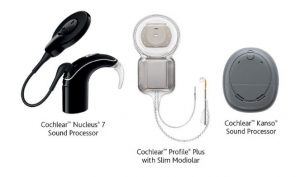Cochlear Limited, the global leader in implantable hearing solutions, obtained U.S. Food and Drug Administration (FDA) approval on March 17 to lower the age of cochlear implantation from 12 months to 9 months for children with bilateral, profound sensorineural hearing loss.
Cochlear implants have been FDA approved for use in children since 1990 with CochlearTM Nucleus® Implants obtaining the first approval. Decades of research and current surgical and clinical practice underscore the efficacy of earlier implantation to achieve their personal best language and speech outcomes.1-13 The research and support in practice by trained hearing health professionals provided the foundation to approve the indication be lowered to 9 months, along with the considerable developments in technology and evolving speech coding strategies in modern day cochlear implant devices.
In addition to research, experience from current surgical and clinical applications point out the importance of early implantation effectiveness to achieve the best language and speech results. Research by hearing health professionals, significant advances in technology and developing speech coding strategies in today’s cochlear implant devices have played an important role in confirming the reduction of the indication to 9 months.
 Speaking after the FDA approval, Gül Erden, General Manager at Cochlear Turkey, noted that cochlear implants are one of the most revolutionary and effective modern implantable solutions that can restore hearing in children and adults with congenital hearing loss. Erden continued as follows: “At this point, the application of the device without delay after early diagnosis is critical in terms of returning hearing and not speaking. Our FDA approval will ensure that children born with hearing impairment can access cochlear implants as soon as possible. In this way, the adaptation of the individual to normal life will be accelerated and become easier.”
Speaking after the FDA approval, Gül Erden, General Manager at Cochlear Turkey, noted that cochlear implants are one of the most revolutionary and effective modern implantable solutions that can restore hearing in children and adults with congenital hearing loss. Erden continued as follows: “At this point, the application of the device without delay after early diagnosis is critical in terms of returning hearing and not speaking. Our FDA approval will ensure that children born with hearing impairment can access cochlear implants as soon as possible. In this way, the adaptation of the individual to normal life will be accelerated and become easier.”
The World Health Organization reports flour by world 466 million (6% of the world population) people from hearing loss suffer. 93% of people with hearing loss are adults and 7% are children. An estimated 5.5 million people have “extremely advanced” sensorineural hearing loss (SNNQ). It is estimated that the number of babies born every year with severe hearing loss is between 100,000 and 150,000. In two comprehensive studies, the rate of babies born with severe hearing loss was determined as 0.7-1.1%. Turkey, one of the countries with the highest incidence of congenital hearing loss and three in our country every year about 2,600 to 4,500 is born with congenital hearing loss baby comes is evil. It has a significant impact on a child’s life, including hearing loss, speech and language development, literacy, mental health, social and cognitive functioning, educational success, employment and socio-economic opportunities. Studies show that children with severe to profound hearing loss using cochlear implants can better recognize voices than children who continue to use hearing aids and underline the need to delay access to cochlear implants.

Cochlear implantation offers development of children when applied at the right time, visual awareness of sound levels in the normal hearing range, speech perception, sound clarity, language skills 2 , to hear the noise 3 , QOL 3 and education 4 . 12 months younger cochlear implants applied at the entrance to the school, 80 percent of normal levels in children’s vocabulary can have what, and again to 81 percent of children in formal education can participate early. 1, 5
References
-
Dettman SJ, Dowell RC, Choo D, Arnott W, Abrahams Y, Davis A, Dornan D, Leigh J, Constantinescu G, Cowan R, Briggs RJ. Long-term communication outcomes for children receiving cochlear implants younger than 12 months: A multicenter study. Otol Neurotol. 2016 Feb; 37(2): e82-95.
-
Novak MA, Firszt JB, Rotz LA, et al. Cochlear implants in infants and toddlers. Ann Otol Rhino Laryngol Suppl 2000;185:46-49.
-
Hirschfelder A, Gräbel S, Olze H. The impact of cochlear implantation on quality of life: The role of audiologic performance and variables. Otolaryngol Head Neck Surg. 2008 Mar;138(3): 357-362.
-
Wyatt JR, Niparko JK, Rothman M, deLissovoy G. Cost Utility of the Multichannel Cochlear Implant in 258 Profoundly Deaf Individuals. Laryngoscope.1996;106:816–821.
-
Semenov, YR, Yeh, ST, Seshamani, M, Wang, N-Y, Tobey, EA, Eisenberg, LS, Quittner, AL, Frick, KD, Niparko, JK, CDaCI
Investigative Team. Age-Dependent Cost-Utility of Pediatric Cochlear Implantation. Ear Hear. 2013;34(4):402-412.
#CochlearImplants #HearingLoss


